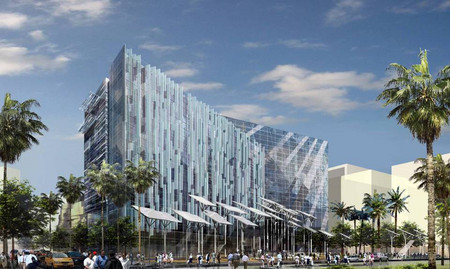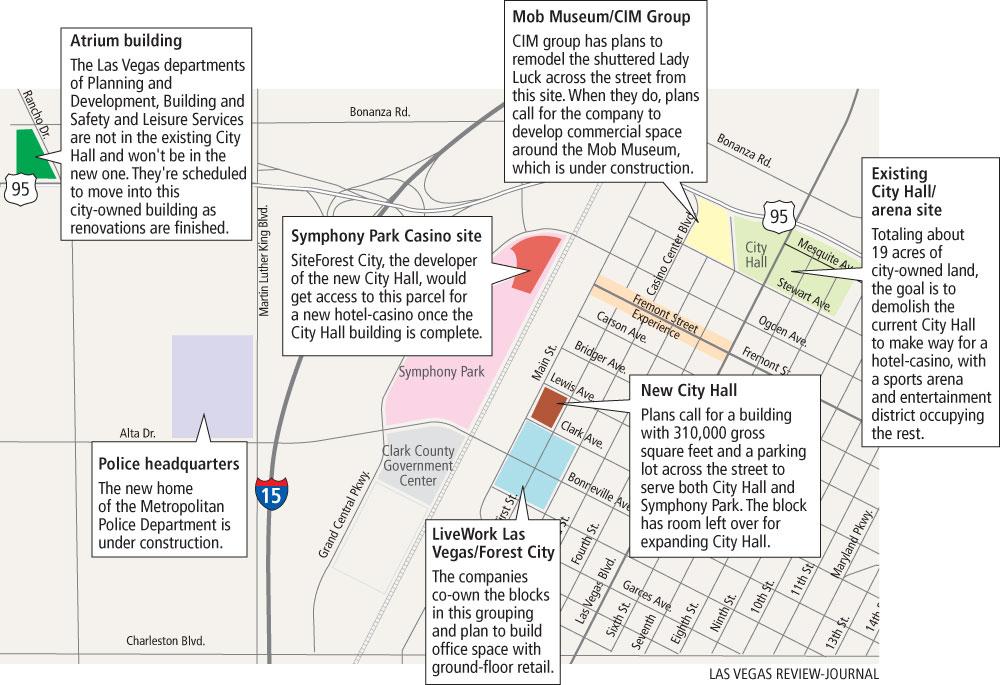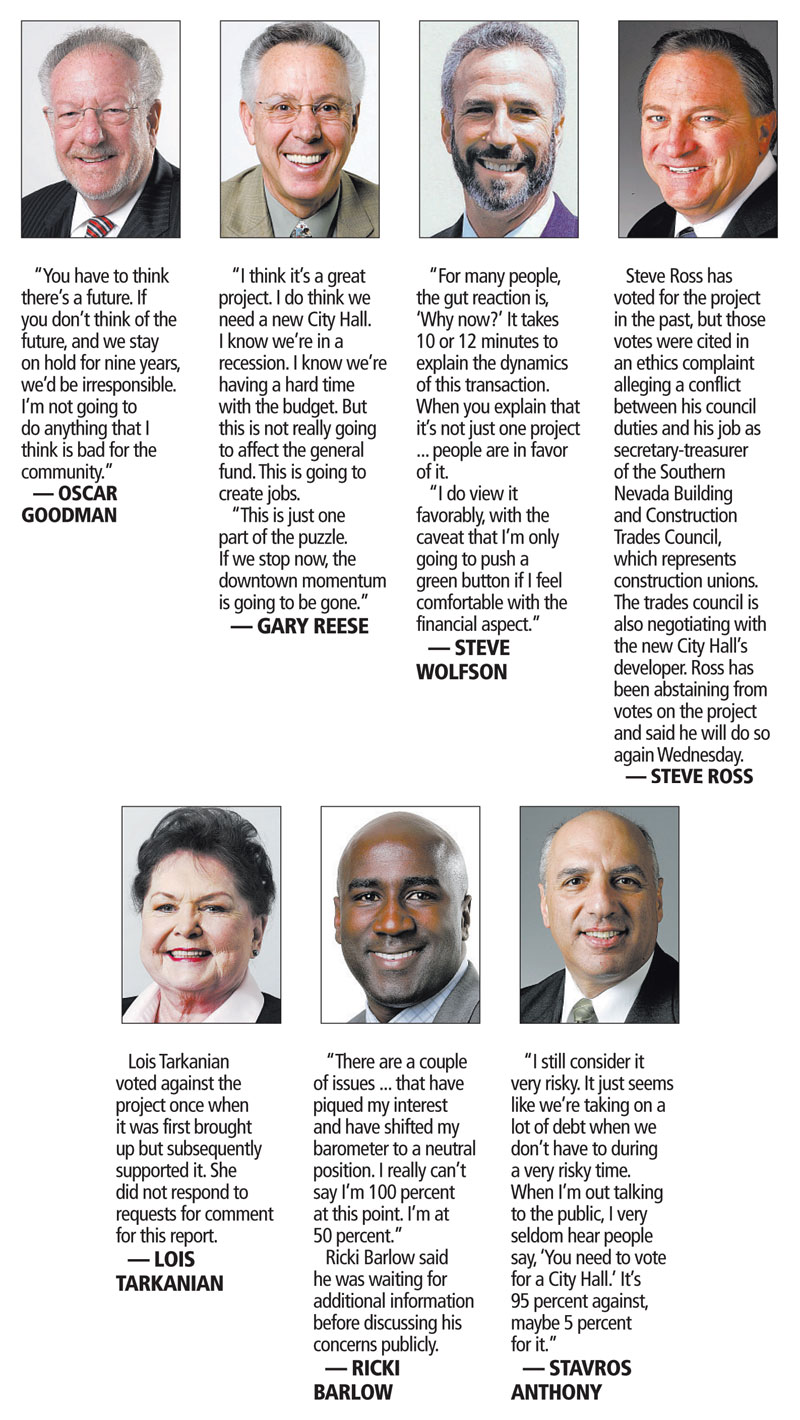Ready to roll the dice
The existing Las Vegas City Hall was completed in 1973, but the corner of Stewart Avenue and Las Vegas Boulevard has been the seat of city government since the early 1940s.
That's when the city took over most of the American Legion War Memorial building there, eventually occupying the entire building and expanding it as Las Vegas grew in the 1950s and 1960s.
Now, in true Vegas fashion, the city wants to ditch the high-profile corner to make way for a casino.
There's more to the proposed new City Hall project than that, though. Supporters, led by Mayor Oscar Goodman, see it as the catalyst that will set off a wave of development downtown as well as a local stimulus package that will create construction jobs.
But supporters also acknowledge one key risk: an uncertain economic future. Even with an economic recovery, Las Vegas isn't likely to return to the days of fast-growing budgets; and if the project doesn't spur downtown development as hoped, the city could find itself in a financial pickle of its own making.
"I still consider it very risky," said City Councilman Stavros Anthony, who has been the only council member consistently voting against the project. "Our general fund deficit keeps growing. The (Redevelopment Agency's) budget keeps shrinking.
"There's a very good possibility the general fund is going to be on the hook for this in the future."
The Redevelopment Agency is a separate city entity that channels new revenue from development in certain areas, mostly downtown, into additional projects as incentives to draw investment. It relies on property taxes, which are expected to drop in the next couple of years.
It is responsible to consider worst-case scenarios, Goodman acknowledged.
"At the same time, you have to think that there's a future," Goodman said. "This is the time that the government's supposed to step up. This is the time for us to create jobs."
The City Council is scheduled Wednesday to vote on pursuing the project, provided the financing meets the city's projections. If approved, construction of the building would take about two years.
The new building, to be erected on a downtown block bounded by Main and First streets, and Lewis and Clark avenues, would be 310,000 square feet with room for a second tower to be built on the site.
The existing City Hall has 276,000 square feet, although 70,000 of that is being used by the Metropolitan Police Department -- for now. A new police headquarters is under construction at Martin Luther King Boulevard and Alta Drive. Like the proposed City Hall, the new police building is a "lease-purchase" deal, with a developer constructing the building and the police department moving in as a long-term tenant. Clark County and Las Vegas will share the $12.2 million annual cost for 30 years, and there is an option to buy the building.
A consultant's report on City Hall in 2008 noted that using the Police Department's space would allow the existing City Hall to provide office space for as many as 350 employees.
Still, the report recommended against staying put, concluding that a City Hall would need 388,750 square feet by 2025, quickly outgrowing the existing building. That figure was based on growth rates before the economic downturn. These days, the city is holding positions vacant and has even laid off some employees.
The existing building is also showing its age, officials say. It already has been expanded once, and maintaining it is likely to require renovations, such as replacing the heating and cooling system. The building's electrical distribution system, for example, is so old that replacement parts aren't manufactured anymore. The new building is also expected to save $500,000 in energy costs each year.
The departments now housed in City Hall would move to the new one and would be joined by KCLV-TV, Channel 2, the city's television station, which currently occupies outside offices.
Three departments not currently in City Hall -- Planning and Development, Building and Safety and Leisure Services -- are going to move to what's known as the Atrium building, a 138,500-square-foot building the city owns at Rancho Drive and U.S. Highway 95.
The new City Hall would feature a larger council chamber, lobby space for the chamber and building, and a parking garage on Main Street that would serve City Hall and the Smith Center for the Performing Arts.
The new building "position(s) the city to come out of the current economy with a building that allows room for growth" and would also be more efficient in terms of organizing departments, work space, public access and energy use, according to a city release.
Construction costs have been moving downward, at least for now. The city originally was authorized to borrow $267 million for the project, but the current construction estimate is $146 million, with total costs equaling $185 million. In addition to lower construction costs, the city wants to use a federal stimulus program that offsets some of the borrowing expenses, and that program expires after next year.
That's still a large chunk of money, and the long-term commitment to paying it back worries the project's detractors.
In pursuing a new City Hall, Las Vegas would be promising to pay off the building using any available funds, including those from the general fund, which pays for city operations and personnel costs.
The general fund is in bad shape right now because of the economic downturn's impact on tax revenues, especially the consolidated sales tax and property taxes which make up the bulk of the fund. Sales tax revenue is in free fall, and property taxes are expected to start slipping because of lower real estate values.
Over the next five years, Las Vegas expects to have to plug at least a $430 million hole, $60.5 million of that in the next budget year, or roughly 13 percent of the expected annual general fund budget. Reserves can make up some of that deficit; but since the city must pass a balanced budget each year, cuts in services, pay and benefits, and even personnel are being examined.
That's the concern for critics such as Anthony. Even though the first payment is years away, the fact that the city is struggling to make ends meet makes him wary about committing to millions of dollars in payments in the future.
"It just seems like we're taking on a lot of debt when we don't have to during a very risky time," he said.
Geoffrey Lawrence, a fiscal policy analyst at the Nevada Policy Research Institute, said his organization generally opposes the Redevelopment Agency's methods, since the funds used for development incentives could be spent on public services. The proposed City Hall presents additional concerns, he added.
"It's a really convoluted plan," Lawrence said. "They're putting a lot of faith into hoping the dominoes fall where they want. It's hard to know if it will all go through. You expect the steward of public dollars to use extreme caution. Maybe it's appropriate that it's Las Vegas, but they are gambling."
Some critics have pushed for a public vote on the project, and the Culinary Workers union tried to force one earlier this year with a pair of ballot initiatives. Las Vegas won a court fight to keep the measures off the ballot. The stated reason for not seeking a vote is that it would delay the project, although city leaders have acknowledged that it's a complicated proposal that can be hard to convey to voters.
One other option, should the city find itself unable to pay, is raising property taxes. The city couldn't be forced to do so, but there is room in the city's property tax cap for the City Council to increase that levy.
"If that is the only way, and if they wanted to, they could move it up to that threshold," city spokesman Jace Radke said. "But they have shown no desire to do so."
As for the risk, it's worth it, proponents say, because of the jobs that would be created and for the chance to take parcels that are now city-owned, vacant or both and turn them into productive, taxpaying projects.
One local financial expert recently told council members that this project should be viewed as a local version of the stimulus plan enacted at the federal level.
"The banks will have to see a stabilization of the economy before they lend again," said John Restrepo of Restrepo Consulting Group, who has a contract to periodically update the council on the status of the local economy. "You can't have the public sector on the sidelines.
"Whatever the public sector can do to encourage development ... all that works together to help move us forward. If you don't do it in the middle of an economic downturn, a recession ... when is the right time?"
Goodman and others have even taken to calling Las Vegas Boulevard the city's equivalent of "waterfront property" that's far too visible and valuable to be occupied by a municipal building.
With City Hall moved, almost 20 acres of city-owned land on both sides of Las Vegas Boulevard could be opened for development, and the land is being evaluated as a site for a sports arena, entertainment district and hotel-casino.
Next to the new City Hall would be office towers with 900,000 square feet of space to be built by Forest City, the developer of the new City Hall. The company co-owns five blocks in that area and, once the new City Hall is complete, would trade that block for a parcel in Symphony Park on which another hotel-casino would be built.
"We're fully committed," said Jeffrey Linton, with Cleveland-based Forest City, emphasizing that the company bought the land. "We're going to do something come hell or high water."
The new site would put Las Vegas government next to the Regional Justice Center and close to the federal courthouse while opening up several blocks on Stewart Avenue for uninterrupted entertainment development, he said.
Those blocks include the shuttered Lady Luck, which is awaiting remodeling, as well as potential new construction surrounding the under-construction Las Vegas Museum of Organized Crime and Law Enforcement, also known as the Mob Museum.
Officials predict revenue from the new projects, and sales of city land could cover the costs of a new City Hall.
The most recent economic forecast also projects that the city will return to pre-downturn revenue levels by 2014 or 2015, but also predicts that growth will be much slower than what the city has had in the past.
"Can I guarantee those things are going to happen? No, I can't," Goodman said. "Can I tell you I'm working my tail off to get them done? Yes, I can.
"If we're not able to meet an obligation some eight or nine years from now, we're going to be speaking Cantonese and eating chow mein."
Contact reporter Alan Choate at achoate@reviewjournal.com or 702-229-6435.



















